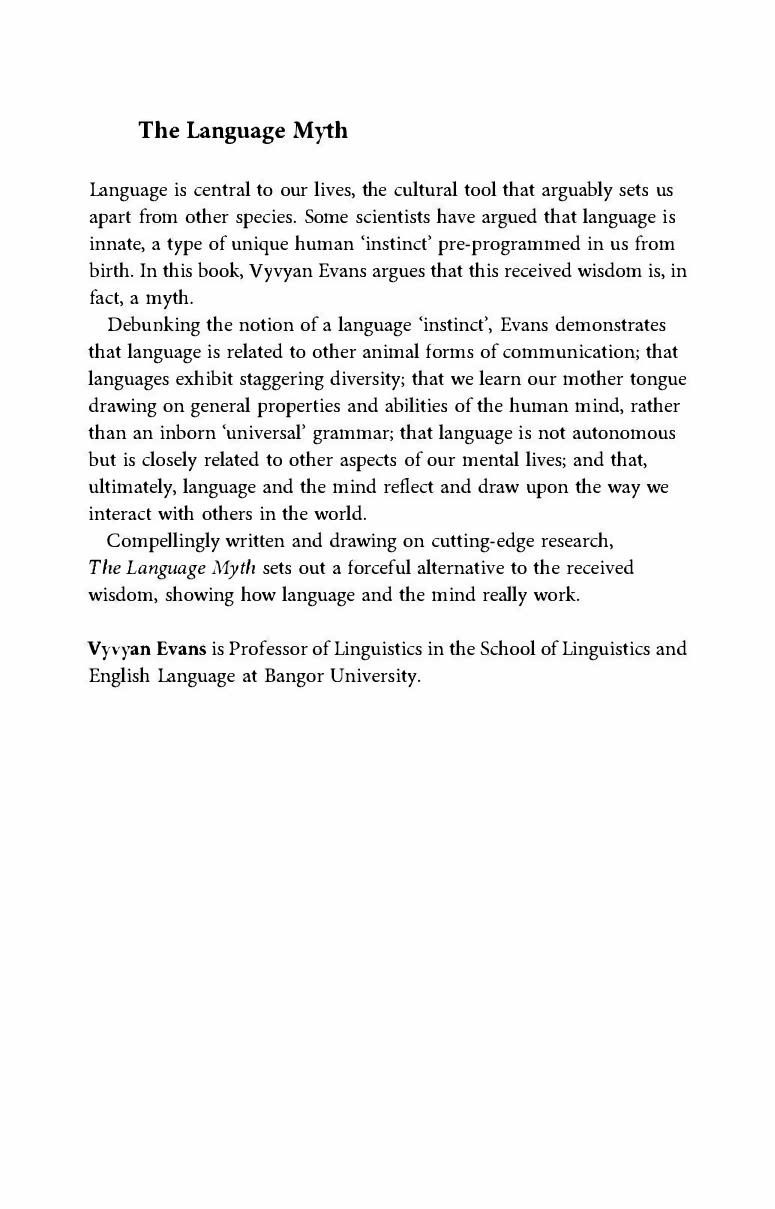The Language Myth: Why Language Is Not an Instinct by Vyvyan Evans

Author:Vyvyan Evans [Evans, Vyvyan]
Language: eng
Format: azw3, pdf
Publisher: Cambridge University Press
Published: 2014-09-21T16:00:00+00:00
Alas, poor Darwin
The modular view of mind has a long history, arising from a materialist tradition in which mental functions are localised in specific regions of the brain. In 1784, a German physician named Franz Joseph Gall claimed that character, thoughts and emotions are generated by specific brain regions. He developed an approach, known as phrenology, which mapped various personality traits onto specific brain regions.
A phrenologist’s representation of the brain. (Symbolical head showing the natural language of the faculties (litho), English School (nineteenth century) / Private Collection / The Stapleton Collection / The Bridgeman Art Library.)
Although phrenology became extremely popular in the nineteenth century, it was soon being disparaged. In 1843, François Magendie called it “a pseudo-science of the present day”. Despite its bad press, arising from its stereotyping of intelligence along ethnic lines based on measurements of skull size, and its concomitant racist overtones, phrenology was nevertheless an important step. Arguably for the first time, phrenology represented an attempt to understand human behaviour in neurological rather than purely philosophical terms.
The modular view of mind, while not directly related to phrenology, nevertheless takes a narrow one-to-one view of mind function and brain localisation. Indeed, researchers who have taken a modular view of language have extrapolated away from this, claiming that other types of intelligence might be modular too. Pinker speaks for all arch-modularists when he wonders whether “maybe the rest of cognition is a bunch of instincts too – complex circuits, each dedicated to solving a particular family of computational problems posed by the ways of life we adopted millions of years ago”.45 Pinker proposes that abilities as diverse as the following are all distinct modules of mind: intuitive mechanics, intuitive biology, number, mental maps for large territories, habitat selection, recognition of danger, detection of food contamination, and on the list goes.46
This radical view – that the mind consists entirely of different kinds of modules – has, in fact, been worked out in some detail by the self-dubbed evolutionary psychologists Leda Cosmides and John Tooby. And so-called ‘evolutionary psychology’ achieves an apotheosis of sorts in their 1992 volume The Adapted Mind. Pinker himself also advocates massive modularity; he claims that this explains how the mind works.47 The idea, in essence, is that: “Like a swiss army knife, the mind is an assembly of specialised tools, each of which has been designed for some particular purpose.”48 Modules evolved for dedicated functions, ranging from “choosing a mate, choosing one’s diet, seeing, spatial orientation, face recognition”, to our ability to engage in mind-reading – attributing particular mental states to other people – and, of course, our ability to process grammar.49 And as these modules evolved to provide an evolutionary advantage, they are sometimes referred to as Darwinian modules.
So far, so good. But here’s the difficulty. Language has been proposed, by the massive modularity crowd – Cosmides, Tooby and Pinker – as the best example of a module. And, as we’ve seen, in the case of language, modularity fails. Evidence for other putative modules is necessarily far harder to come by.
Download
The Language Myth: Why Language Is Not an Instinct by Vyvyan Evans.pdf
This site does not store any files on its server. We only index and link to content provided by other sites. Please contact the content providers to delete copyright contents if any and email us, we'll remove relevant links or contents immediately.
A Dictionary of Sociology by Unknown(3078)
The Art of Dramatic Writing: Its Basis in the Creative Interpretation of Human Motives by Egri Lajos(3063)
The Dictionary of Body Language by Joe Navarro(2993)
0041152001443424520 .pdf by Unknown(2844)
How The Mind Works by Steven Pinker(2813)
Day by Elie Wiesel(2781)
Merriam-Webster's Collegiate Thesaurus, Second Edition by Merriam-Webster Inc(2754)
The Meaning of the Library by unknow(2565)
The Official Guide to the TOEFL Test by ETS(2326)
A History of Warfare by John Keegan(2240)
The Emotion Thesaurus: A Writer's Guide to Character Expression by Puglisi Becca & Ackerman Angela(2142)
Emotion Amplifiers by Angela Ackerman & Becca Puglisi(2032)
MASTER LISTS FOR WRITERS: Thesauruses, Plots, Character Traits, Names, and More by Bryn Donovan(1940)
Merriam-Webster's Pocket Dictionary by Merriam-Webster(1931)
The Cambridge Guide to English Usage by PAM PETERS(1909)
Star Wars The Rise of Skywalker The Visual Dictionary by Pablo Hidalgo(1892)
More Than Words (Sweet Lady Kisses) by Helen West(1860)
Lucky Jim by Kingsley Amis(1747)
American Accent Training by Ann Cook(1655)
